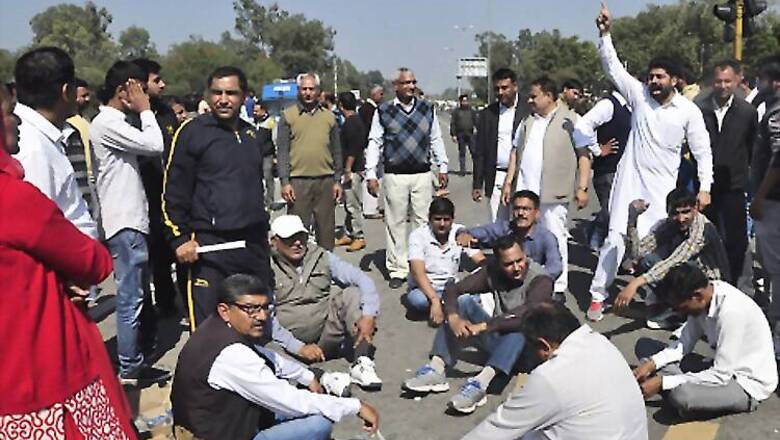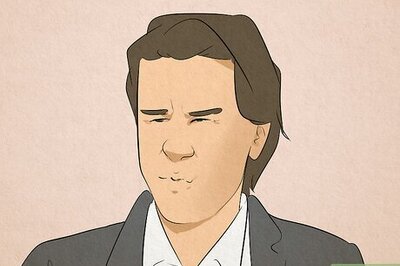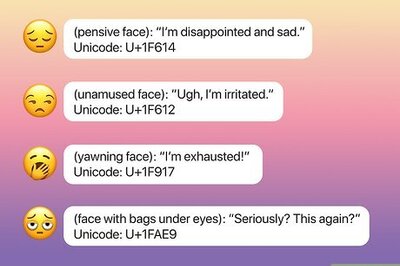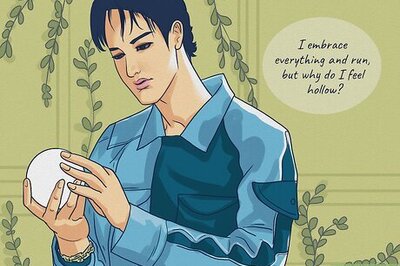
views
The winds of political discontent seems to be clearly having their way. With the JNU controversy still simmering, the Jats in Haryana occupied the headlines, having taken to the streets demanding inclusion in the OBC category. The Union government has sought to diffuse the situation by appointing a high-level committee to look into the demands of the Jats.
One is reminded of the famous limerick whenever such committees are appointed, as it best defines and describes the attitude of whoever is in power, 'If you can, don't move; If you must, move slowly; If pushed, move in circles and If cornered, appoint a Committee!'. All Committee's take their time to deliberate and recommend …. and then the authorities can leisurely reflect on the recommendations before (if at all) coming to any decision. Committees are a sure way to place an issue on the 'back-burner'.
It is noted that in the agitation for quotas by the Jats, their principal ire was targeted against those who represented power in the state of Haryana. The BJP had ridden to power in the state of Haryana in October 2014, winning on a strong wave of anti-incumbency against the ruling Congress and disillusionment with the opposition INLD.
Both the Congress and INLD suffered huge reverses in the state assembly polls. Prior to the Lok Sabha elections, the BJP had a limited electoral presence in the state and strategically occupied the political space created by a retreating Congress and an ineffective INLD. It had also come to power in Haryana on a slew of promises made to different segments of society on a range of issues.
It must, however be noted that the Jat community is the single largest caste in the state of Haryana accounting for 29% of the population. The community has often been considered the dominant player in state politics. Even though the BJP won 7 of the 10 Lok Sabha seats from Haryana in 2014 (the INLD won 2 and the Congress 1), the National Election Study 2014, conducted by Lokniti-CSDS, showed that, the INLD got a majority of the Jat vote with the BJP trailing with just 19% of the votes of this powerful social group.
Even in the State Assembly elections, though the BJP won 47 of the 90 Assembly seats, the INLD which emerged as the principal opposition with 19 seats, secured over 40% of the Jat votes, with the BJP securing a mere 17% of the votes of this dominant social group.
The BJP rode to power by consolidating support among the Forward castes and non-Jat backward castes. When the BJP was due to announce the leader of its legislature party and future Chief Minister, there was immense speculation whether the party would choose a Jat to head its government.
The party took a decision to make a non-Jat as the first BJP Chief Minister. The leadership of the state thus moved from a Jat Chief Minister of the Congress (Bhoopender Singh Hooda) to a non-Jat Chief Minister of the BJP (Manohar Lal Khattar).
Over the last 16 months, with the BJP in power in the state, the Jat community had been extremely restive as power appeared to be moving to the hands of rival social groups. The Jats have also come to realize that during the years that leaders from their community were in power, very little had been done to accord special provisions and concessions for them in terms of reservations and inclusion among the OBC category.
Ever since the implementation of the Backward Caste reservation in the 1990s, the Jats have been demanding their inclusion among the list of Other Backward Castes.
While Bhoopender Singh Hooda as Chief Minister won the 2004 Assembly elections promising to secure reservations for the Jats, it was only after a decade in power did his government attempt to grant the Jats the status of Specially Backward Castes (SBCs) but the same was struck down by the Courts.
When the BJP came to power it attempted a tight rope walk on the Jat reservation issue as it anticipated a backlash from those benefitting from OBC reservations in the state as any inclusion of the Jats would make them a dominant beneficiary of the limited reservation quota.
The attempts to enlarge the percentage of reservations had earlier been struck down by the Courts and the offer of the current Chief Minister to grant Jats Economically Backward Castes status cut little ice as the community knew that such a move had the potential of once again being struck down by the courts. The restiveness amongst the Jats became even more pronounced as the state had a non-Jat Chief Minister after close to two decades.
The government seems to be 'buying time' through constituting a Committee to look into the matter. Given the complications involved in including the dominant caste in the category of backward as this may cause an equally strong backlash from other the existing beneficiaries, the fact of the Jat community not being at the centre of political power appears to clearly queer the pitch. A testing time for sure for the BJP which has its political plate already over loaded with challenges, especially in a state where they had finally managed to wrest power from the Congress and the INLD.
(A Political Scientist, Dr. Sandeep Shastri is the Pro Vice Chancellor of Jain University at Bengaluru)




















Comments
0 comment